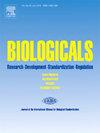Global availability of critical reagents for biologicals testing - Current status, challenges and possible solutions
IF 1.5
4区 生物学
Q4 BIOCHEMICAL RESEARCH METHODS
引用次数: 0
Abstract
On July 2, 2024, the International Alliance for Biological Standardization (IABS) and Humane Society International (HSI) co-hosted a webinar on the global availability and affordability of critical reagents for vaccine and biologics production. Despite growing support for non-animal testing, significant barriers remain, especially in low-income countries facing financial and supply chain challenges.
This meeting showcased successful collaborations on reagent production and shared industry and regulatory perspectives. Key barriers included high reagent costs, import complexities, and the limited number of suppliers. Participants stressed the need for tailored risk-based testing, in-house assay validation, and stronger collaboration for standardised testing. The idea of regional hubs in Africa and Southeast Asia for reagent distribution was also discussed to address logistical challenges.
A central theme was advocating reliance strategies, which promote shared regulatory assessments and resource optimisation, as demonstrated by the EU/EEA OCABR Network activities and South African-European laboratory collaborations. Difficulties facing smaller national control laboratories in meeting international standards were highlighted, along with the need for further innovation in non-animal-derived reagents to address these challenges. Participants stressed the importance of continued global collaboration and adopting reliance practices to improve access to critical reagents and ensure sustainability in biologics testing.
生物制品检测关键试剂的全球可用性——现状、挑战和可能的解决方案
2024年7月2日,国际生物标准化联盟(IABS)和国际人道协会(HSI)共同主办了一次关于疫苗和生物制剂生产关键试剂的全球可得性和可负担性的网络研讨会。尽管越来越多的人支持非动物试验,但仍存在重大障碍,特别是在面临金融和供应链挑战的低收入国家。这次会议展示了在试剂生产方面的成功合作,并分享了行业和监管方面的观点。主要障碍包括高试剂成本、进口复杂性和供应商数量有限。与会者强调需要针对风险进行量身定制的检测、内部分析验证以及加强标准化检测方面的合作。会议还讨论了在非洲和东南亚设立试剂分发区域中心的想法,以应对后勤方面的挑战。中心主题是倡导依赖战略,促进共享监管评估和资源优化,正如欧盟/欧洲经济区OCABR网络活动和南非-欧洲实验室合作所证明的那样。会议强调了规模较小的国家控制实验室在达到国际标准方面面临的困难,以及进一步创新非动物源性试剂以应对这些挑战的必要性。与会者强调,必须继续开展全球合作,采取可靠做法,以改善关键试剂的获取,并确保生物制剂测试的可持续性。
本文章由计算机程序翻译,如有差异,请以英文原文为准。
求助全文
约1分钟内获得全文
求助全文
来源期刊

Biologicals
生物-生化研究方法
CiteScore
3.70
自引率
0.00%
发文量
39
审稿时长
48 days
期刊介绍:
Biologicals provides a modern and multidisciplinary international forum for news, debate, and original research on all aspects of biologicals used in human and veterinary medicine. The journal publishes original papers, reviews, and letters relevant to the development, production, quality control, and standardization of biological derived from both novel and established biotechnologies. Special issues are produced to reflect topics of particular international interest and concern.Three types of papers are welcome: original research reports, short papers, and review articles. The journal will also publish comments and letters to the editor, book reviews, meeting reports and information on regulatory issues.
 求助内容:
求助内容: 应助结果提醒方式:
应助结果提醒方式:


